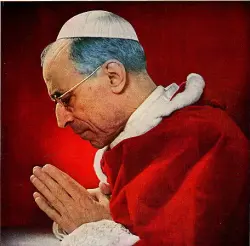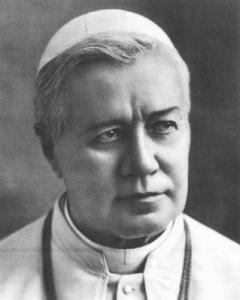Four Days To Go: Infallibility And Mortality
Thanks to the stupidity of our not-so-beloved V II clergy, Catholics the world over are going to be put to a hard test in four days' time.
I have already written on the matter, and have since not found any evidence to the contrary that the infallibility of the canonisations concerns merely the fact that the canonised person is in Heaven. In other words, neither the heroic virtues nor being, say, a halfway acceptable Pope are infallible requirements for the purpose.
Which makes a lot of sense. If Joan of Arc is canonised, must the English become supporters of France? Does the canonisation make of Celestine V a good Pope? And where exactly would the heroic virtue to be seen in St. Dismas for pretty much the entire duration of his life, and his chosen, ahem, profession, bar those hours on the Golgotha? Did Christ ask him to pass a decade-long trial, and prove a life of heroic virtue? No, he made Dismas santo subito instead.
Or let us look at the other side and let us say canonisations are not, and have never been, infallible. What are they then: pious suggestions? Strong hints that someone might be in heaven? “Oh dear Padre Pio, unless the Pope was wrong, please intercede for me!” Hhmmm, doesn't sound like much to me…
“Oh, but you must pick one about whom you are persuaded! Then it will be all fine!” some of you might say. But come on, if it comes to that then it is our personal opinion that really counts, and the entire concept of canonisations crumbles. Say: I do not need any Pope to be practically persuaded that Pius XII is in heaven. Padre Pio had a mystical vision of him in heaven, and Padre Pio's conviction is good enough for me every day of the week. But there is no need for canonisation for that. Barring the obvious concept that in the end only God decides, people didn't need to wait for St Francis' canonisation in order to have an extremely strong degree of confidence that he was in heaven, either.
No. If you ask me, Canonisations can only reasonably mean, if we want to give them the sense most Catholics have always given to them, that in this matter God will not allow mistakes. Because if He did, then there would never be any additional security given by the canonisation, and we would all go back to the “servant of God” scenario: the dearly departed was a very saintly man because of abundant and widely proved examples, and it is therefore very probable that he is in heaven. Unless we are mistaken. Which we could be. Always. Even if he is canonised. Does this make sense? Is this reasonable? Are we of such little faith that we start to doubt God's work whenever things happen we do not like?
Or look at it from the other side: if JP II is not in heaven, why would God allow a canonisation that is, has always been and will always be considered by most Catholics a most solemn, infallible assurance of beatific vision, and company with God? Would God not protect this pious belief, or prevent it from taking such solid roots in the Christian thinking? How can it be that the belief in the infallibility of canonisation – though not, properly speaking, dogmatically declared – could spread in such a way and be so strong after 2000 years? Why would, for example, God have allowed that the canonisation be extended beyond, so to speak, historically safe, “certified” martyrs?
It does not make sense to me. It is like stating that God has allowed the Church to believe what is wrong for 2,000 years. At this point, everything that has not been dogmatically and infallibly declared could be questioned, too, because hey: if it's not officially infallible, then it's everyone's guess.
I rather think this: that if either John or John Paul are not in heaven, the Holy Ghost has inspired Francis not to proceed with the canonisations, but Francis has, with typical stubborn rebellion, decided it was all merely a chimaera of his fantasy, a bad mood of an impressionable old man. And then in the next very few days he will have to die, or will be put in the impossibility of proceeding to the canonisations; because God allows Francis to fool men; but He Himself, He will not be fooled.
Rejoice, therefore. If these disgraceful – because of the message they send, and the V II propaganda they are meant to encourage – canonisations are a lie, the lie will not come to pass, and we might get rid of a disastrous Pope to boot. If they come to pass, they aren't a lie, and we will do what we as Catholics do: believe, obey, and be glad for other people's blessings.
Which does not mean you have to approve this or that Pontificate.
No one ever asked you to approve of highway robbery because of St. Dismas, either.
Mundabor
Posted on April 23, 2014, in Catholicism, Conservative Catholicism, Traditional Catholicism and tagged Canonisation, Padre Pio, Pope John Paul II, Pope John XXIII. Bookmark the permalink. 19 Comments.





















Pope John xxiii was last to revise the TLM missal (1962) just prior to Vatican ii and some say this is evidence that he had no intention to redo the Mass. During his pontificate, Latin had become unpopular both among Catholics and in the secular schools in the USA where most secondary schools were still teaching Latin. The difficulty of learning Latin was an early excuse in the USA for the beginning priest shortage. In the face of all of this Pope John xxiii reiterated the importance of Latin in the Church and in the seminaries. Many say that the plans for the council were revised after pope John’s death, and he was not even alive for most of Vat ii. I think there are some accusations against him that are not well founded.
Pope paul VI followed and wrote the famous Encyclical, Humanae Vitae , some say with the help of John Paul ii. It was believed during his pontificate, even among faithful Catholics in New York, that he pope had a double, who stood in for him at times, and that perhaps he was ill.The sedes still believe that something like that happened. The next Pope died in a month. The Novus Ordo Mass had been in full effect for about 7 years prior to his becoming Pope.
As far as Pope John Paul ii goes, I seriously doubt he was well informed, at least about the Church’s problems in the USA. People constantly complained of inability to reach the Vatican by mail. I did pray to John Paul ii for the cure of my brother who was critically ill and he completely recovered without medical intervention to the amazement of his physician. My prayer went something like this: ” Pope John Paul ii, I think you owe me a favor because of all the problems during your pontificate that may not have been your fault but happened on your watch , and I want you to obtain a cure for my brother”.
I also think that Pope John Paul ii tried to correct some of the errors attributed to Vatican ii
by his many encyclicals..”Veritatis Splendor” comes to mind as an example of clarifying the Catholic doctrine on conscience.
As far as the meaning of canonization goes, at a minimum it is necessary that this pronouncement be infallible so that we do not invoke condemned souls, as perhaps many Spiritus Religions most likely are doing.
But we could not invoke souls in purgatory, either. We are asked to believe they are in heaven, which is why we can ask them for intercession.
The one with the double is hilarious. Some say the most incredible things, and you should tell them to get out more.
No, John did not want to change the mass, but this is no proof of heroic virtue, either. He was, I think, a very naive man; weak and easily led to boot. And this is what he was: led by his nose like a pious ox.
M
A heart warming thought. Nothing like a lightning bolt from above to put the kabosh on the trend towards quickie political canonizations. Now I will tune out my favorite game show and watch the telly as the blessed moment approaches.
The heart of the matter:
” … in this matter God will not allow mistakes.”
What an assurance to have. Christ’s own promise about His Church. Popes, Cardinals, Bishops and Priests, they come and they go. Good, bad and indifferent. The Church goes on.
Correction : last line of paragraph ii should read : The Novus Ordo Mass had been in full effect for about 7 years prior to John Paul ii’s becoming Pope, so it seems quite a stretch to blame it on him,as some people do.
It is very fair to blame JP II for allowing the most absurd liturgical abuses for decades. He himself was, liturgically speaking, a savage from the Amazonian forest, or little better.
M
Just think: Patron saint of V2!
Here’s one perspective: As Catholics, we believe that if someone dies in a state of grace, they are saved (purgatory or heaven). If they met the conditions for a plenary indulgence and then died, then heaven it is.
Since we believe that, the question about these canonizations is a matter of prudence mostly. But we need not be concerned that the Church might possibly canonize someone who is in hell.
For most, these new saints will be like the majority of saints–blessed souls in heaven to whom we don’t happen to have a devotion.
Your point, then, about separating the pontificate from the saint is a very good one.
As far as I know, we are not allowed to believe a canonised saint is in Purgatory.
M
I’m not suggesting we believe a canonized saint is in purgatory. I’m just saying that it is rather easy to believe these newly minted pope-saints are in heaven. I’m sure they confessed and were absolved just before death and met the conditions for a plenary indulgence.
And they had millions of people praying for them every day, to boot.
On the other hand, it is fair to say a Pope is more ferociously attacked by Satan than most men, and might well be tempted and grievously fail in ways unknown to us. Albeit I frankly never had the impression this was the case with the two popes about to be canonised.
I am one of those who think a plenary indulgence is very difficult to obtain – search this blog for more – so in my eyes it would be above the paygrade of a less than saintly Pope anyway.
M
What about saints that were made most likely for political reasons, or saints that were canonized, and then refuted later and removed from the calendar, or those who were removed because the Pope had been deposed (thus making all his pronouncements void)? I’m thinking of Charlemagne, for one.
I find the whole matter confusing. When you start saying that God wouldn’t allow mistakes, aren’t you christening V2 with that statement? This is the argument I always have with my happy clappy catholyc friends, they say that everything that happens in the Church is ordained, you know?
AFAIK, no papal canonisation was ever retracted. Charlemagne and Constantine were never saints of the Church. If the acts of a Pope also caused retroactive de-canonisations is not known to me. I’d say the measure only concerns the earthly things – say, the appointment of cardinals – not the heavenly ones.
If, however, such cases were to be proved in a true, historically ascertained way, then I would say it would be a very interesting argument against the infallibility of canonisations.
M
Are these canonisations a punishment? I feel God is permitting these as part of the Chastisement.
I think they are.
Sow Vatican II, reap a Modernist maverick.
M
What about St. Philomena, Little St. Simon of Trent or my patron St. Apollonia? I thought they were all removed from the calendar.
AS far as I know, many who were “removed” were never really “installed”.
San Gennaro, among the most famous Italian “saints”, was never canonised, and might have never existed.
But I am thankful for every document or source.
What we are looking for is not saints proclaimed by bishops, or by the mob; but after a formal canonisation process then declared bogus.
Again: I am grateful for every serious source.
M
I wondering if this is the beginnings of “dial an annulment”? Considering how many annulments are granted in the USA ( by far the largest number in the world), it appears to me that there is somewhat of a ‘lemon law’ attitude toward the annulment process, and that it needs to be tightened up rather than made easier. The clarification may involve a careful study of what conditions historically were necessary to contract a valid marriage, compared with the present.
Sorry, this comment is for the article today re the Pope’s latest phone call .